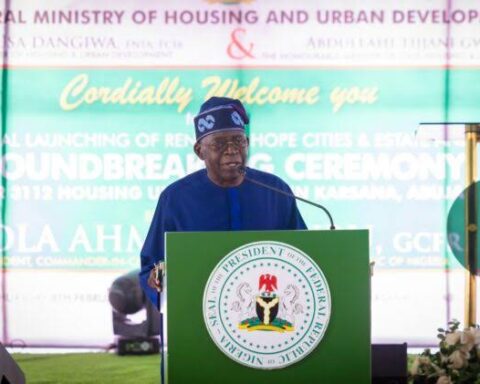Nigerian President Bola Ahmed Tinubu, has called for a fair and inclusive energy transition that protects the interests of developing economies, urging member countries of the Economic Cooperation Organisation (ECO) to prioritise climate justice and shared prosperity.
Speaking through the Minister of Budget and Economic Planning, Senator Abubakar Bagudu, during the 17th ECO Summit in Khankhendi, Azerbaijan, President Tinubu emphasised that climate change poses a clear and present danger, citing widespread droughts, floods, desertification, and extreme heat waves that continue to disrupt livelihoods and economies.
“Nigeria, endowed with both fossil and renewable energy, supports a just energy transition,” the president said, stressing the importance of equitable access to clean energy technologies and technical partnerships.
The summit, themed “New ECO Vision for a Sustainable and Climate-Resilient Future,” brought together leaders from the 10-member regional bloc to discuss collective climate actions, sustainable development, and economic integration.
Tinubu outlined Nigeria’s climate action agenda, which includes integrating green industrialisation and adaptation into the nation’s upcoming National Development Plan (2026–2030), aligned with the 2030 Sustainable Development Goals (SDGs).
“It is not by accident that the current National Development Plan ends in 2030. It is to ensure that Nigeria remains on track with the SDGs while embedding climate priorities into our long-term planning,” he said.
The president highlighted the urgency of inclusive growth, calling on ECO members to empower rural communities, women, and youth through entrepreneurship, digital inclusion, and grassroots climate adaptation.
“No vision for sustainability is complete without inclusive growth,” Tinubu declared. “The benefits of trade, transport, and energy must reach rural farmers, fishing communities, and women entrepreneurs.”
As Africa’s most populous country and economic gateway to West Africa, Nigeria pledged to champion a stronger ECO-Africa Trade Corridor. Tinubu proposed tariff harmonisation, streamlined customs procedures, and multimodal logistics platforms to deepen regional trade integration.
He also advocated for an ECO-wide strategy on Energy Interoperability and Transition, cautioning that the move from fossil fuels to renewables must be sensitive to the development needs of transitional economies.
President Tinubu called on the ECO to emerge as a united bloc advocating for climate justice, fair global trade terms, and equitable financing ahead of the COP30 negotiations, describing the summit as a “defining moment” for the region.
“Let our unity serve as both a shield and a ladder for resilience and shared prosperity,” he said.
Earlier in his opening remarks, President Heydar Oghlu Aliyev of Azerbaijan welcomed delegates and expressed pride in Azerbaijan’s expanding role in the ECO, announcing the creation of the ECO Research Centre and Clean Energy Centre in his country.
Aliyev revealed that over $350 billion in investments had been attracted to Azerbaijan over the last 20 years and noted that the nation exports natural gas to 12 countries via multiple pipelines.
He also commended the designation of Shusha as the ECO Tourism Capital for 2026.
Founded in 1985 by Iran, Pakistan, and Turkey, the ECO aims to foster economic, technical, and cultural cooperation among member states. The organisation now includes Afghanistan, Azerbaijan, Kazakhstan, Kyrgyzstan, Uzbekistan, Tajikistan, and Turkmenistan.








